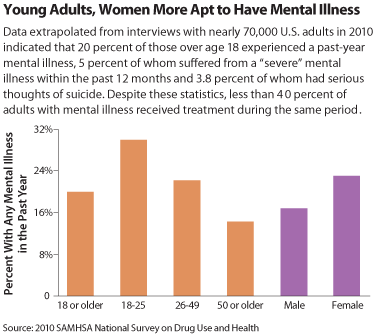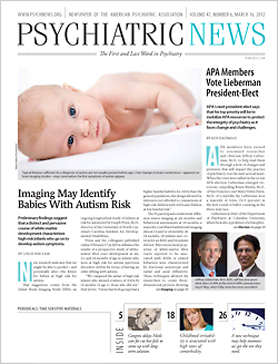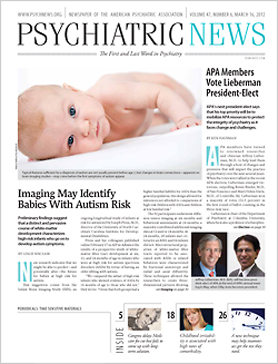About 20 percent of U.S. adults aged 18 or older suffered from a diagnosable mental, behavioral, or emotional disorder in the past year. However, more than 60 percent of these 45.9 million individuals failed to receive mental health services during that period.
This according to recently released mental health data from the Substance Abuse and Mental Health Services Administration’s (SAMHSA) 2010 National Survey on Drug Use and Health.
The report also noted that approximately 8.7 million adults (3.8 percent of the adult population) had serious thoughts of suicide in the past year, with 2.5 million (1.1 percent) making suicide plans and 1.1 million (0.5 percent) attempting suicide.
Additionally, 9.2 million adults experiencing mental illness in the past year (20 percent) met the criteria for substance dependence or abuse in that period, compared with 11.2 million adults (6.1 percent) who did not experience mental illness within the past 12 months.
Survey data were collected through more than 68,000 face-to-face interviews with a representative sample of the U.S. population.
Interviewees were asked questions about the presence of psychological stress and suicidal ideation, receipt of inpatient and outpatient services, and use of prescribed medication and/or illicit drugs. Subjects were identified as having experienced past-year mental illness and/or drug dependence and abuse based on DSM-IV criteria.
Demographically, women were more likely than men to have experienced a past-year mental illness (23 percent versus 16.8 percent). And adults aged 18 to 25 were more than twice as likely to have experienced a mental illness in the past year than those over age 50 (29.9 percent versus 14.3 percent).
The report also found that 11.4 million adults (5 percent of the adult population) suffered from a past-year “serious mental illness,” defined as one resulting in serious functional impairment that substantially interfered with or limited one or more major life activities.
Of individuals experiencing a serious mental illness within the past 12 months, 25.2 percent (2.9 million adults) had co-occurring substance dependence or abuse.
In regard to treatment, more than 60 percent of those with a past-year serious mental illness said they accessed mental health services during that period.
The report also provided data on the mental health of young people, finding that 1.9 million youth aged 12 to 17 (or 8 percent of this population) experienced a major depressive episode in the preceding year. And individuals in this group were found to have more than twice the rate of past-year illicit drug use (37.2 percent) of their peers who did not experience a major depressive episode during the prior year (17.8 percent).
The high prevalence of substance dependence or abuse among adults with mental illness, as well as the drug use reported by youth having experienced a past-year major depressive episode, signals a need for substance use disorders to be better addressed by mental health treatment specialists, SAMHSA officials pointed out in the report. These findings also support the further development of integrated mental health and substance use treatment facilities, according to the report.



